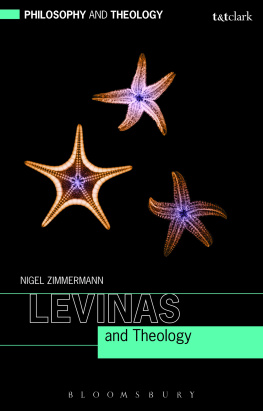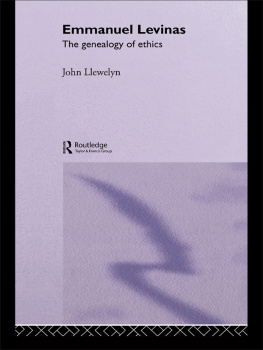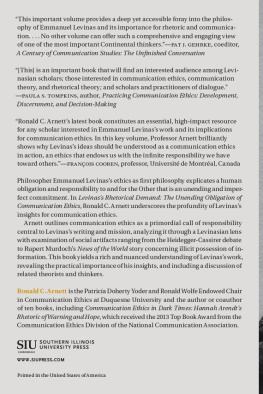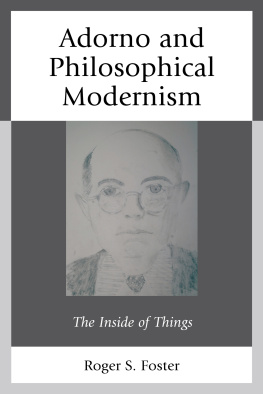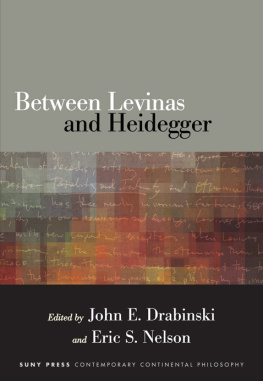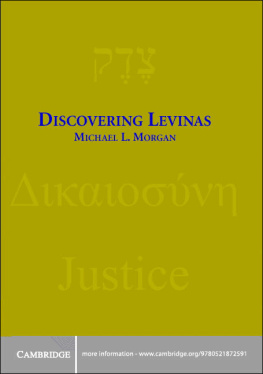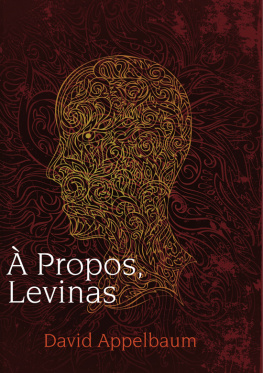Eric S. Nelson - Levinas, Adorno, and the Ethics of the Material Other
Here you can read online Eric S. Nelson - Levinas, Adorno, and the Ethics of the Material Other full text of the book (entire story) in english for free. Download pdf and epub, get meaning, cover and reviews about this ebook. year: 2020, publisher: State University of New York Press, genre: Science. Description of the work, (preface) as well as reviews are available. Best literature library LitArk.com created for fans of good reading and offers a wide selection of genres:
Romance novel
Science fiction
Adventure
Detective
Science
History
Home and family
Prose
Art
Politics
Computer
Non-fiction
Religion
Business
Children
Humor
Choose a favorite category and find really read worthwhile books. Enjoy immersion in the world of imagination, feel the emotions of the characters or learn something new for yourself, make an fascinating discovery.
- Book:Levinas, Adorno, and the Ethics of the Material Other
- Author:
- Publisher:State University of New York Press
- Genre:
- Year:2020
- Rating:5 / 5
- Favourites:Add to favourites
- Your mark:
- 100
- 1
- 2
- 3
- 4
- 5
Levinas, Adorno, and the Ethics of the Material Other: summary, description and annotation
We offer to read an annotation, description, summary or preface (depends on what the author of the book "Levinas, Adorno, and the Ethics of the Material Other" wrote himself). If you haven't found the necessary information about the book — write in the comments, we will try to find it.
Levinas, Adorno, and the Ethics of the Material Other — read online for free the complete book (whole text) full work
Below is the text of the book, divided by pages. System saving the place of the last page read, allows you to conveniently read the book "Levinas, Adorno, and the Ethics of the Material Other" online for free, without having to search again every time where you left off. Put a bookmark, and you can go to the page where you finished reading at any time.
Font size:
Interval:
Bookmark:
Part One
After Nature
Ethics, Natural History, and Environmental Crisis
Chapter One
Toward a Critical Ecological Model of Natural History
Here, as everywhere, the identity of nature and humans appears in such a way that the restricted relation of humans to nature determines their restricted relation to one another, and their restricted relation to one another determines humans restricted relation to nature.
Karl Marx, The German Ideology
Introduction to Part One
It is said that we live today in the epoch of the Anthropocene (which is very much determined as the Capitalocene) and after the end of nature. But the denial that nature is a reality independent of human construction is a typical gesture of modern Western philosophy and its underlying rationalism (as identity thinking) and idealism (as the prioritization of the constitutive individual or a collective subject). Due to the complex and mediated tensions between human animals and their own nature as well as with animals and nonhuman nature, which are rooted in the material conditions of human life and the desire to master them, nature is reduced to a lesser stage or condition to be overcome by spirit, a concept to be posited and constructed by individual or collective human subjects, oras in naturalistic and pragmatic modelsan object to be controlled through instrumental techniques. Given these antagonisms, it might be the case that nature is not yet over but has not yet arrived.
delineates a natural historical response to current ecological crisis tendencies as sedimented entanglements of nature and history.
Natural history is a primary critical model in the chapters of , one can pose the question of whether an appropriate culture and ethics of nature is possible, even if the existing environmental situation and disaster have established the need. What might a culture and an ethos of nature mean?
To offer preliminary heuristic definitions for the time being, which can be concretized only in the course of their exposition, it might be said that nature is the dynamic material transformation of things; culture a way of symbolically, linguistically, and intersubjectively relating to others, oneself, and ones world; and ethos a comportment or orientation in the midst of all this. Ethics is often defined as a normative discourse concerning norms and values about relations between human subjects, a definition that will be questioned in the following pages. Ethics is first and foremost concerned about someone else; that is, the (materially and sensuously embodied) others who are prior to (unconditionally prior in Levinass language) and presupposed by imperatives, prescriptions, and values.
Alienated nature and reified culture are entangled phenomena such that a new culture, ethics, and political economy of nature and material relations are requisite. The current work contests the separation of the natural and normative, and the conflict between naturalism and normativism in ethics and social theory, since each is a one-sided expression of a more complexly entangled reality that is shot through with facticity and normativity. Nonhuman animals and ecosystems have had at best a secondary ethical status conceived through human affects and interests, and typically less than this in modern societies. However, the significant counterexamples of historically recent movements toward ecological, environmental, and animal rights illustrate how critical social theory and philosophy can take alternative routes.
The five chapters of .
Natural History and the Politics of Nature
Jrgen Habermas is a representative example of a contemporary critical social theorist who has neglected the ethical import of nature due to an interhuman characterization of ethics as communicative intersubjectivity. While Habermas insightfully recognizes advanced capitalisms antagonistic and destructive relationships with the environment in works such as Legitimation Crisis , and appreciates the important roles of environmental movements and green politics in the public sphere, he has at the same time limited the formation of critical models in regard to animals, ecosystems, and environments by emphasizing how issues concerning them are either derivative and secondary to interhuman communicative understanding or merely pragmatic decisions about nature as a realm of objects and resources governed by anthropocentrically defined human needs and the logic of instrumental means-ends rationality. Habermass articulation of postmetaphysical reason fails to overcome the neo-Kantian bifurcation of facticity and validity and the natural and the normative. It consequently anthropocentrically marginalizes the in- and nonhuman in eliminating possibilities of an ethics of nature as a metaphysical or romantic remnant.
This problematic is deeper than Habermas. Even thinkers suspicious of the philosophy of the constitutive subject and pure historicity have adopted constructivist positions that take nature and human anthropology to be socially and discursively determined. Benjamin claimed that philosophical anthropology is a bourgeois category and that the Marxist understanding of human beings demands recognizing their thoroughgoing historicity. not claim that human nature is historically relative, an idea he criticized in culturally oriented historicism, but rather that human nature, driven by its natural and socially modified drives and needs, historically and environmentally changes and adopts.
Problematic ideas concerning the ahistorical objectivity of natural processes underwrites the dichotomy between the natural and the ethical. Within more recent analytic Marxist theory, Jon Elster has claimed that the most fantastic element in Marxs philosophy is the idea of the domination of nature and the thesis of humans drastically transforming the natural world through labor, industry, and technology. Elster contends, Marxs views [about the human relationship with nature] in this respect are either rambling and incoherent, or inherently trivial. Nature is more than the heavens above, distant stars, and the vastness of the cosmos; nature encompasses the local places and spaces that have been rearranged and reconstructed through human activities. From small beginnings in agriculture and housing through industrialization and its effects, human activities have had massive effects on a planetary scale. Deniers of climate change contend that human activity cannot modify nature in any radical way. This prejudice has been repeatedly disproven by the disappearance of species, the destruction of ecosystems, drastic fluctuations in climate, and the increasingly chaotic weather patterns that are already underway.
Natural History and a Nature Still to Come
Nature is often presupposed to be an archaic past overcome by human activities, history, and spirit, resulting in the human-defined world and socially and economically determined ecologically destructive societies of the Anthropocene. There is a significant sense though in which nature is futural and yet to come. self-preservation is at stake, the hegemonic ideological separation between humans and nature is in need of reevaluation. Natural conditions and environments and humans are bound together in the changing configurations of natural history. Natural historical entanglements have led to our present environmental crisis-conditions. The nature that we encounter and experience is mediated by far-reaching social-historical transformations of environments and the human condition itself. Much has been undertaken in the last half century to attempt to change our thinking and modify destructive practices toward ecosystems, environments, and nonhuman and human animals. But this remains insufficient. Even the change in attitudes, discourses, and practices achieved appear to be too little and too late. Often the problems have been rearranged to soothe guilty consciences and shifted from the wealthy to the poor, and from the so-called developed to the developing world.
Next pageFont size:
Interval:
Bookmark:
Similar books «Levinas, Adorno, and the Ethics of the Material Other»
Look at similar books to Levinas, Adorno, and the Ethics of the Material Other. We have selected literature similar in name and meaning in the hope of providing readers with more options to find new, interesting, not yet read works.
Discussion, reviews of the book Levinas, Adorno, and the Ethics of the Material Other and just readers' own opinions. Leave your comments, write what you think about the work, its meaning or the main characters. Specify what exactly you liked and what you didn't like, and why you think so.



